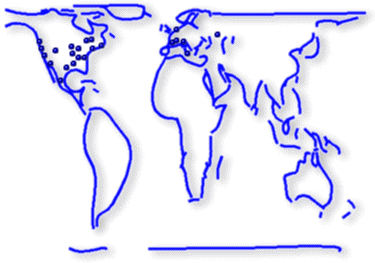Issue
Article
Vol.29 No.2, April 1997
Article
Issue
Issue |
Article |
Vol.29 No.2, April 1997 |
Article |
Issue |

What's in a word? What words should we use to describe the ACM SIGCHI organization? At a recent SIGCHI Extended Executive Committee (EEC) meeting, one discussion point was whether we should refer to SIGCHI as a global, international, or world-wide society. At an earlier EEC meeting, we discussed whether ACM should view SIGCHI's local SIGs as national, regional, or local. Interestingly, we have had these discussions before. As with many words, we do not always share a common understanding of what each of these terms means or which should be used to describe SIGCHI. In this column, we present our view of how terms such as global, international, world-wide, national, regional, and local describe SIGCHI.
In 1657, Blaise Pascal said: Truth is on this side of the Pyrénées and error is beyond. At that time, France did not worry about external influence. Today, as with many countries in the world, France acts both as an agent in a global society of agents, and as a society of local (more regional) agents. Such agents are both interdependent and different from each other. Other countries, ACM, SIGCHI, and local SIGs within SIGCHI act similarly.
Current information technology reinforces the need to simultaneously operate locally in some contexts and globally in others. For instance, even as the Internet tends to decrease the distance between people and communities of people, their own perspectives should be preserved. Technology should be put to the service of people and not the other way around, i.e., people to the service of a constraining technological society.
The SIGCHI organization today is continually being redesigned and developed within a world-wide framework. SIGCHI has long sought to actively involve many groups and many views in the operation of our society. The continuing challenge is to understand the complexity of local groups that need to interact in the global environment. Note that local does not just apply to nations in the world-wide environment, but also to local SIGS in the SIGCHI environment, and to special interest areas within the HCI environment. We need to recognize, support, and foster diversity in all these dimensions.
An important SIGCHI objective is to identify, to explain and to illustrate current interests and orientations of HCI groups and communities that want to open themselves to the world. We propose to broaden the perspectives of these groups beyond their borders or their specific cultures. We also want to better understand these local cultures that come from different backgrounds. Regional and national differences often bring great values for the benefit of the whole. We do not want global to mean homogenized. We would like to establish bridges between worlds (this was the theme of InterCHI93). We would like to share specific knowledge defined by specific cultural perspectives, to discover emerging common knowledge.
When someone says: "I belong to SIGCHI", we like him or her to feel at home. Belonging to the SIGCHI world-wide organization should empower any member without letting him or her lose his or her local identity. Local does not mean only geographically local; it could mean local in a domain-specific or task-specific way. Local SIGCHI chapters have their own specific characteristics. They are developed as focal points for transferring information and resources back and forth from SIGCHI to local HCI researchers and practitioners. SIGCHI is a volunteer driven organization. Each SIGCHI member is welcome to participate and is entitled to an appropriate level of support and coordination. This is what the Executive Committee of SIGCHI is trying to develop.
Investigating the local aspects of SIGCHI also means looking at the domains where HCI is important. These domains include aerospace, education, entertainment, medicine, and telecommunications, among many others. Each domain has its specific rules, methods and tools, some of which can be shared with other domains. We would like to improve this kind of emergence within the framework of our global evolution. We see HCI as a technological glue among various approaches to the integration of information technology in our lives and hope to see conferences that focus on HCI issues in these domains.
The information society influences the evolution of work and collaboration. We are moving from army to orchestra to jazz band. Work is less hierarchical, routine-based or well-defined. People have become more autonomous within cooperative work environments. Globally, coordination between more autonomous agents needs to be defined. Locally, adaptation to new tools and work is a crucial issue. In particular, HCI cannot be disconnected from mutual consideration of social, cultural and domain issues. We encourage the organization of world-wide forums where these issues can be discussed and we invite you to join with us in maintaining SIGCHI as an agent in a global society of agents and as a society of local agents.
Mike and Guy
Issue |
Article |
Vol.29 No.2, April 1997 |
Article |
Issue |